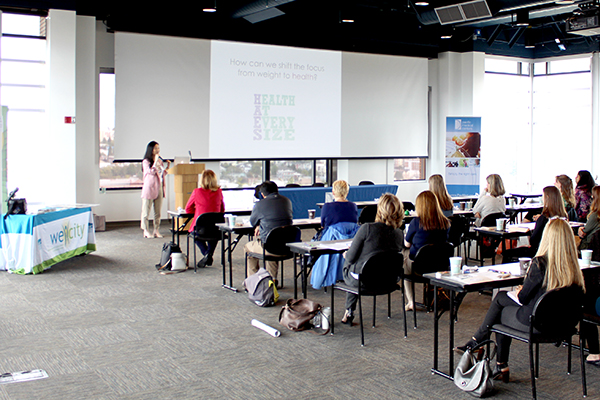Leaving the Nest 101

PacMed provider gives parental advice on college-bound teens
Stress abounds for former high schoolers as they prepare for college endeavors and begin to make the transition into adulthood. Parents have their hands (and hearts) full as well, making plans for their beloved offspring to flee the nest in pursuit of higher education.
College students may have different back-to-school needs than their younger counterparts. Can you tell me what those items may be? What health screenings and/or immunizations should take place prior to students going off to college?
For patients in their adolescent or young adult stage (usually between ages 12 to 18 years old), and parents of adolescents, we encourage openly addressing behaviors, associated questions, and the importance of regular health screenings. The five most common (and important) conversations for both adolescents, and their parents, include: Risky Health Behaviors(alcohol consumption, drugs, tobacco and e-cigarette devices, sexual activity); Physical Activity (engaging in 30-45 minutes of exercise most days of the week, exhibiting healthy eating and dietary habits); Obesity (If a child is obese, consider having their blood pressure and cholesterol levels checked regularly and screen for diabetes); Mental Health (screening for depression and other mental health issues is also very important at this age); and Updated Immunizations (students and parents should keep all immunizations updated. It is also a good idea for the student to keep a copy of their immunization records for future references, as they transition out of the house. This can easily be kept on their phone and should include Tdap every 10 years, Menactra and MenB, HPV, Hepatitis A, Hepatitis B and Influenza yearly).
Are there any health concerns that are unique to college students? If a young person has a health concern while away at college, how should they proceed?
Parents and their college-aged children should become familiar with the health services available at their college, as most colleges and universities have university clinics on campus.
Keep in mind the following: Where is the clinic located? What are their hours? What’s the nearest clinic or doctor for after-hour needs? Do they offer mental health services at this specific university or college? It’s also important that the child know their insurance status and keep a card in their wallet.
How can parents help their children stay healthy from afar while they are enrolled in college?
Make sure your children are aware of their past medical history and the family’s medical history, such as autoimmune disorders, psychiatric, heart disease, or diabetes. They should be aware of any history of asthma, concussions, hospitalizations, surgeries, or allergies to medications. Ensure they know what medications they are taking, the names of these medications, details and the dosage. Also, it would be great for your child to have a small first aid kit that they can keep in their dorm room. This would include Band-Aids, triple antibiotic ointment, thermometer (make sure they know how to use it), sterile gauze/pads of different sizes, adhesive tape, antiseptic wipes, Tylenol or Motrin, and a list of emergency contact numbers and their primary care provider’s details.
Do you have any more healthful tips and suggestions for parents and college-bound kiddos?
Living in a dorm, your child will be exposed to lots of new people in a new and unfamiliar environment. They will probably be using the same showers, toilets, sinks, doorknobs/glasses — and unfortunately, exposed to lots of germs. Be sure to share the importance of regularly washing your hands often, especially before eating or touching your face. The use of antibacterial gels works just as well as washing — share that they can carry a small container in purse or pocket. College is a period filled with fun, excitement, nervousness, and change. However, there are many people available to the student to help in that transition to make sure it is filled with happiness and good health.
Beat the Heat with Health!

PacMed provider discusses most common causes of summer clinic visits
Summertime is almost upon us, and with that exciting seasonal change comes a host of amusing activities enjoyed by people of all ages. Whether living it up on the water or simply relaxing poolside, safety should be a paramount concern for individuals and families of all ages.
Here, Pacific Medical Centers’ Dr. Xiulian Chen examines the summer clinic visit trends of both youth and adults. Read on for tips on how to stay safe while having fun in the sun.
In your experience, what have been the most common reasons for summer clinic visits for youth?
Heat-related illness, food poisoning and gastroenteritis, and sports and swimming injuries are the most common summer clinic visits for children.
Heat rash is a rash caused by blockage of sweat duct and is more common in young children but can happen to anyone. It can look like tiny bubbles, red dots, pimples, or sometimes it can be skin-colored dots. It tends to happen on the neck, chest, head or armpit. Heat exhaustion occurs when a person’s internal temperature rises and causes the following symptoms: nausea, fatigue, weak, heart racing, light-headed, muscle cramps. When the person’s internal temperature continues to rise above 103 F or higher, heat exhaustion leads to heat stroke. The symptoms of heat stroke include: headache, confusion, agitation, rapid breathing, and heart racing.
Summer is the peak season for food borne illness and gastroenteritis, since warm temperatures provide the perfect conditions for bacteria to grow on food products. Cooking outside makes it harder for us to wash cooking utensils and our hands, this allows bacteria to get into our food. Common symptoms for food poisoning include: abdominal pain, diarrhea, vomiting, fever, headache or light-headed from dehydration.
What about adults and military personnel?
Sunburn, heat exhaustion and heat stroke are very common in adults — especially military personnel during training. In terms of water and sun safety, many of the principles discussed above apply here as well. Some of the water safety rules include: swimming with a buddy, avoiding alcohol before swimming, checking local weather forecasts prior to swimming in lakes or the ocean, learning how to perform CPR, and paying special attention to individuals who have seizure disorders (since they have a higher risk of drowning).
What precautions can people take to avoid these issues and accidents?
Sunburn can be prevented by avoiding midday sun, avoiding excessive amounts of time in the sun, using protective clothing and hats, and applying sunscreen of at least SPF 15 according to package directions. To prevent heat-related illness, try wearing light-colored, loose-fitting clothing, drinking extra fluids, and staying in the shade whenever possible. In order to avoid food-borne disease, refrigerate any food that can spoil easily. Store prepared food in cold spaces if possible and avoid letting food stand in the heat for prolonged time. To help prevent water or swimming accidents, it is important to supervise children closely. If you are hosting a pool party, make sure there is a designated person to watch the kids in the pool.
What treatments should be utilized if someone is impacted by any of the issues discussed above?
The treatment for heat rash is to cool the skin down and stay dry. When heat exhaustion happens, move to a cooler place, wet the clothing, or take a cold shower and try to sip on water. The important part of treating food poisoning is to increase oral hydration with fluids with electrolytes. In severe cases, the person may need to go to the hospital for intravenous fluids. The treatment for sports-related injuries generally starts with RICE (rest, icing, compression and elevation).
What else would you like readers to know about summer safety and preparation?
Other things that need more attention in the summer include insect bites and disease spread by insects. Mosquitoes not only can cause an allergic reaction, but also spread bacteria and cause infection. Tick borne disease is not common in Washington state, but if you are traveling to an endemic area — especially military personnel who travel often — always remember to search for ticks when you are in the woods and grassy places. It helps to wear long pants and long-sleeved shirts that are tucked in.
LWA Worksite Wellness Symposium 2019 – RSVP today!
This year the Living Well Alliance is hosting its 4th annual Workplace Wellness Symposium – a free event that is designed to help Puget Sound-area wellness coordinators promote and grow their wellness programs. This year, network with others in the field, hear from a panel of experts about organizing a wellness team, health fairs and negotiating with insurance brokers. Full lunch provided.
Save the Date: September 11, 2019 from 10-2:30pm in the Pacific Tower, 8th floor panoramic room
1200 12th Ave S Seattle, WA 98144
RSVP to christineg@pacmed.org by August 30. Bring a friend not already connected with LWA and receive a gift card
Recipe: Savory zucchini-egg breakfast muffins
 Summertime means a plethora of fresh vegetables from the store, farmer’s market or your own garden. Zucchini is affordable and delicious, and it compliments most meals. Try it in these breakfast muffins!
Summertime means a plethora of fresh vegetables from the store, farmer’s market or your own garden. Zucchini is affordable and delicious, and it compliments most meals. Try it in these breakfast muffins!
NUTRITION CORNER: Get more fruits and vegetables into your day
Summer is such an easy time to add an extra serving of fresh fruits and vegetables to your day. Produce is plentiful in grocery stores and local gardens. For maximum health benefits, medical experts recommend 5-7 servings of fruits and vegetables each day. Eating more produce has been linked to a lower risk of cancer, diabetes and heart disease. Along with exercise, make this a high priority for your health!
Here are a few tips:
- Make it convenient. Y Have a mixture of fresh, frozen and canned fruit and vegetables on hand. This makes it easy to add them to sandwiches, soups, stir-fries, pizzas, yogurt or salads.
- Shop locally. There’s nothing like the local farmer’s market or fruit stand to get out of your produce comfort zone! Signing up for a produce box is another good way to experiment with new flavors. Need a recipe? Search the USDA My Plate Kitchen site.
- Sign up for a cooking class. Learning new ways to cook produce can help you discover what appeals most to you and inspire you to cook more fruits and vegetables after the class. Try a local cooking class through Living Well Alliance, YMCA, PCC or Cancer lifeline.
- Swap vegetables in place of grains. Have you heard about zoodles (zucchini noodles) or spaghetti squash taking the place of pasta? You can also try using cauliflower for rice. Another trick? Hiding vegetables in plain sight: shredded carrots in muffins, frozen spinach in smoothies, pureed canned beans in brownies.
- Fire up the grill. Grilling produce adds flare to a summer meal. Try vegetable kababs or experiment with grilled fruit like pineapple, pluots or peaches.
PacMed is smart, wired and fun
Smart. Our doctors regularly share their expertise in interviews with our local media. Here’s how to catch that latest PacMed provider videos of their interviews.
Wired. Through our secular partnership with Providence Health & Services, PacMed has some great partners—like Swedish Medical Center! By joining together, we have access to excellent tools, like our new MyChart. With MyChart, you can schedule appointments, see test results and message your doctor—all online. If you’re a PacMed patient, learn more and get started with the new MyChart.
FUN! Yes, it’s that time of year again—time for the popular PacMed Back-to-School Bash in Federal Way on August 14, 5:30-7:30 PM! This free event offers cooking demos, a scavenger hunt, face painting, healthy snacks, prizes and more. Visit www.PacMed.org/BackToSchool for all the details.
Back-to-school checklist for parents
 Parents, get a jump on September with our back-to-school checklist for immunizations, checkups and communicating with your child’s school. You’ll also find inspiring ideas for healthy lunches and tips on which vaccines are recommended for your child.
Parents, get a jump on September with our back-to-school checklist for immunizations, checkups and communicating with your child’s school. You’ll also find inspiring ideas for healthy lunches and tips on which vaccines are recommended for your child.
Check out PacMed Back to School
Happy, safe and healthy vacation fun
Summer is here and travel season is officially in full swing. Dr. Ari Gilmore shares these tips for fun and safe adventures.
Outdoor Safety:
- Apply sunblock that’s SPF 30 or higher every two hours or after swimming in saltwater.
- Avoid alcohol while boating or have a designated boat driver.
- Know your capacity with waves and ocean currents. If caught in a riptide, face into the waves and swim out diagonally about 100 feet; then try to return to shore again.
- Wear the right shoes for the activity. Don’t hike in flip-flops; wear sturdy shoes that cover your feet.
- Keep an eye on the ground when you’re walking. It’s easy to get distracted by the sights and trip!
Food Safety:
- If eating from a food truck, observe it first to see if they have clean meal preparation surfaces and whether it’s busy and popular.
- Avoid fresh fruit that has been prepared out of your sight. Cooked vegetables are generally all right to eat, but it’s a good idea to avoid the lettuce/cabbage on tacos.
- Always wash your hands with soap and water before eating.
Travel vaccines:
- Avoiding Zika virus: Zika is endemic near the equator, in warm humid climates. Physicians recommend women wait eight weeks after departing a location where Zika might be present before attempting to get pregnant. Likewise, we recommend men wait six months after visiting, because they have the ability to transmit the disease for some time, even after symptoms have subsided.
- Make sure you have the proper vaccines if you’re travelling abroad. Visit www.CDC.gov/travel or consult at least one month before you depart with a travel-clinic physician regarding malaria, typhoid and yellow fever.
Long flights:
- Jet lag has less to do with time changes and more to do with the low pressure and low oxygen levels on the aircraft. Increase your oxygen intake by drinking more water in-flight and being properly hydrated in the days before your flight. Also, avoid alcohol (which causes dehydration).
- Get up from your seat every few hours to stretch your legs and do a few calf squeezes to increase blood flow.
Trips with children:
- On a long car trip, take breaks and walk with your kids for 5-10 minutes. This blows off steam and helps circulation.
- If your child is in diapers, pack individual diapers in plastic baggies—easy to grab and a bag for disposal, too.
- Expect some acting out and fussiness—travel is stressful for everyone! Come prepared with snacks (such as nuts, granola bars, dried fruit and crackers) and activities (books, finger puppets, drawing materials, a new toy).
Food allergies:
- Research your dining options in advance. At a restaurant, ask open-ended questions, like “What kinds of oil is in the salad dressing?” instead of “Does this contain walnut oil?”
- Avoid buffets. It’s easy for foods to be cross-contaminated when serving utensils are shared across containers.
- Take the medications you need for an allergic reaction, and know where the nearest hospital is that can treat you or your child.
Ari Gilmore, MD, practices family medicine at the PacMed Beacon Hill clinic. You’ll also find comprehensive travel services for adults and children at The PacMed Travel Clinic—like country-specific health advice and immunizations. Bon voyage!









